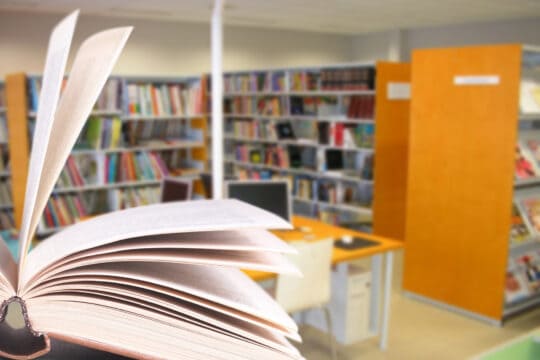
Deposit Photos
In most communities, the local library is no longer just a room with books. Step inside, and you’ll discover a dynamic hub where curiosity thrives, ideas bloom, and neighbors connect. Libraries have quietly transformed into vibrant learning centers, offering resources and experiences that go far beyond reading. They offer access to technology, organize events for all ages, and create an inclusive environment.
Educational resources: libraries as learning centers
Public libraries serve as a hub where people of all ages can advance their academic skills, pursue special interests, and develop research shills. Whether you’re a toddler attending story time, a student prepping for exams, or an adult exploring a new career path, libraries offer programs tailored to every stage of life. Think coding workshops, resume clinics, language classes, and even genealogy research tools—all free and open to the public.
Writing resources
Libraries often provide resources to help students with writing assignments — including academic databases like Gale eBooks, Explora, and Britannica School, which include support for student writers. Some branches may also offer seminars on argument construction and essay construction.
For college-level writing, libraries often provide free access to citation management tools, style guides (APA, MLA, Chicago), and writing handbooks. But even with this kind of support, there may be situations where working independently is not enough. If this is the case, students can turn to the services of essay writers for hire as an auxiliary tool. These professionals offer reliable assistance with academic work, and can assist with assignments of varying complexity.
Academic support
Libraries help students along their academic journey by offering free access to research databases, study materials, and quiet work spaces. Many branches feature dedicated teen or student zones equipped with computers, printers, and Wi-Fi, making it easier to complete assignments and conduct research.
Libraries also host homework help programs, tutoring sessions, and writing workshops, often in partnership with local educators or online platforms. For university students, particularly those living off campus, public libraries are community-powered learning hubs that can level up the college experience.
College expenses add up fast. A library card unlocks free access to:
- Academic databases and research tools
- Resume-building workshops and career prep
- Language learning apps and test prep guides
- Printing, scanning, and even 3D printing in some branches
Critical thinking skills & tech literacy
Libraries also actively support critical thinking and media literacy development. They offer resources to help students search for reliable information and perform basic fact-checking.
Most libraries today offer access to computers and other tech resources. For example, the Fulton County Library System actively supports the development of digital skills among residents through the Connect the Dots for Digital Equity initiative. Participants complete a series of training sessions, and may receive a free laptop upon completion.
Other libraries offer free courses in coding, media production, or tech tools like Microsoft Office and Adobe – effectively removing financial barriers to learning.
Community resources: libraries as inclusive spaces
The local library is a welcoming third space, open to everyone. Libraries are one of the few public spaces where everyone is welcome and can linger without spending a dime. They offer warmth in winter, air conditioning in summer, and a quiet refuge year-round. For many, they’re a second home—a place to study, reflect, and belong.
Community engagement
From author talks and book clubs to civic forums and cultural celebrations, libraries host events that spark dialogue and build understanding. They’re safe spaces for exploring new ideas, meeting diverse voices, and engaging with your neighbors. They also offer story hour and interactive activities for the youngest learners.
Some libraries even feature maker spaces—creative zones with tools like 3D printers, sewing machines, and art supplies. These spaces encourage hands-on learning and collaboration, turning passive consumers into active creators.
Students may need a distraction-free zone with reliable Wi-Fi and comfy chairs and the local library has them covered. Many offer private study rooms, collaborative spaces, and extended hours during exam season. Bonus: no need to fight for outlets or whisper over the hum of espresso machines.
Social support
In many cities, the local library is a place where individuals may both learn and get guidance in areas like creating resumes, completing the paperwork necessary to access social services, or filing college applications.
Libraries also offer a welcoming environment for those experiencing homelessness, unemployment, or social isolation. By providing free access to books, internet, restrooms, and comfortable seating, libraries create a safe and dignified space for people to spend time without pressure to spend money or justify their presence. Staff are trained to assist patrons with empathy and discretion, helping people navigate challenges without judgment.
Beyond physical access, libraries foster social support through programming that builds community. Story times for children, book clubs for adults, and inter-generational events bring people together around shared interests.
Libraries often host workshops on mental health, financial literacy, and civic engagement, empowering patrons with knowledge and connection. Many branches also partner with local organizations to offer services like food distribution, legal aid, and housing assistance—turning the library into a bridge between individuals and vital community resources.
Cultural diversity
Perhaps most importantly, libraries promote belonging. They create inclusive spaces that reflect and celebrate the richness of their communities. They curate collections that represent a wide range of cultures, languages, identities, and experiences—ensuring that everyone can see themselves in the stories they read.
Libraries also host multicultural events, heritage month celebrations, and bilingual programming that foster cross-cultural understanding and dialogue. From signage in multiple languages to staff trained in cultural competency, libraries actively work to make every visitor feel welcome, respected, and valued.
In a world that can feel increasingly fragmented, public libraries remain one of the few places where everyone is welcome, and where learning and support go hand in hand.



